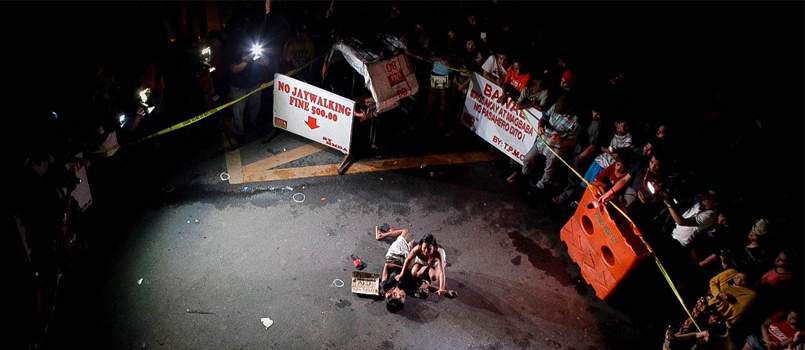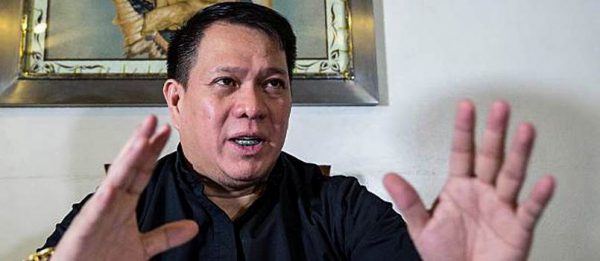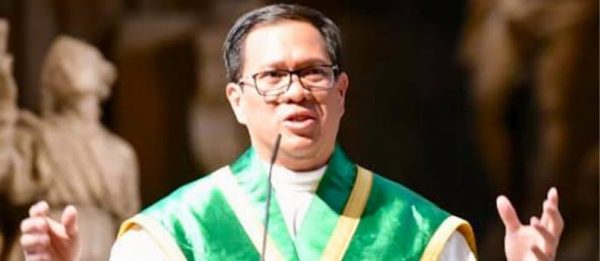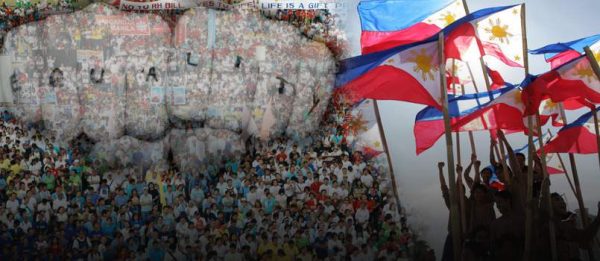1,080 total views
“Reign of terror”
President Duterte was visibly irked by the Catholic Bishops’ Conference of the Philippines (CBCP) stinging rebuke of the killings under his administration. In a pastoral letter written last January, the Bishops described the killings as a “reign of terror’’ that victimized mostly the poor. Though, not actually a denunciation of the President as it is a description of factual events, the president went on a cursing spree, calling once again the Bishops as hypocrites and even accused one of maintaining two “wives”.
The President’s rant isn’t a hyperbole but an angry retort to the Bishops’ harsh description of law enforcement and human rights under his watch.
Regardless of claims to the contrary, this “reign of terror” is proof of the country’s criminally unsafe environment. The Philippine National Police (PNP) and operators of fake news who boast of people’s safety in the streets cannot say the same about the safety of those in their houses. Many were killed while sleeping in the “comfort” of their homes. The blood of suspected criminals becomes an agonizing proof of the poor’s vulnerability and hopelessness in our society. While we do not accuse the police as perpetrators of these crimes, there have been cases where policemen were involved.
Let’s admit that crimes of passion committed usually under the influence of drugs are plenty. In anger, the demand for outright execution of these criminals is loudly heard. Many cheer the carnage in the streets and homes without realizing that one day, they can be victims, too, of extrajudicial killings.
Such is the cruelty of our time. But the Bishops, guided by prudence and noble intention, see drug dependents as victims, too, of a harsh and unjust social system. They are deprived of education, they are often unemployed, they don’t have humane existence and they are languishing in poverty. The enormous amount of money to be spent for them is repeatedly lost to corruption. Sad reality, but these should not justify their commission of criminal acts.
So, while the Bishops do not tolerate these criminals, their view of the problem is much more extensive compared to a narrow-minded assessment that drug dependents are irredeemable scums of society. Killing these “undesirables’’ won’t make our society prosperous and peaceful. It will only perpetuate a cycle of violence, strengthen a culture of impunity, and create a misguided sense of accountability. For as long as the real scumbags, who author these harsh, unjust and corrupt system, are in positions of power, we, Filipinos will always be losers in the fight for just, humane, prosperous and peaceful society.
This pervasive killing is certainly a crime against the poor and it is a testament to the government’s irresponsible and abusive law enforcement measures.
Human rights vs. Right to defend society
President Duterte is being heroic and clever every time he says, “I will not let drugs destroy my country”. He sees his critics as idiots for opposing his drug policies and brands them as not caring enough for the future of the country. For pundits, it’s a plain braggadocio that earns a lot of points from his unsuspecting supporters.
The State of the Nation Address (SONA) is a showcase of this mindset. He said “human rights groups trivialize heinous crimes with human rights and due process. If you add human rights and due process, you stink and your mouth smells”.
Thankfully, the President spared the Church from his own stinking derision of the institution but not Sen. De lima who was badmouthed and subjected to the President’s double-standard of morality. He asked, “is she a credible woman? Can she be a moral person? You’re all drama”.
But, Isn’t the President also trivializing the laws, institutions and persons who call for the protection of human rights? Is he not imposing his peculiar value system?
The Philosopher Nietzche spoke of “transvaluation of values” which means that long held values become wrong and the wrong ones become right. Duterte’s notion of defending society at the expense of human rights is an example of Nietzche’s philosophy of values. Isn’t the right and proper way to address the drug problem is thru defense of rights and society? Defending human rights, after all, is not about letting the criminal go scot free but making him accountable under the lens of society’s legal processes. To kill him without these processes makes our laws unstable. And the instability of laws can lead to society’s destruction.
To those who defend human rights, it is about challenging the government to be the protector of the people and the guardian of rights. At any rate, men, under the egalitarian principle and regardless of their status in life, are regarded as equal in terms of rights before the law. (Atty. Michael Jhon Tamayao, Bill of Rights, Preliminaries) It is, therefore, unfair to call human rights advocates coddlers of criminals when they express howls of protest against extrajudicial killings.
Every democratic constitution should include provisions guaranteeing the rights of individuals and those restricting the powers of the government. This is to prevent the tragedy that the government created by the people will in turn be the instrument to enslave and abuse them. (Tamayao, Bill of Rights, Preliminaries)
Some idiots are quick to point out the silence or seeming indifference of the Commission on Human Rights (CHR) every time there’s killing or rape of innocent people. Their pitiful ignorance is exposed for taking to task the CHR to solve such crimes or at least to make some noise about them. However, the country’s law enforcement agencies like the PNP, NBI, CIDG, etc. are the ones mandated to solve cases of such nature. And the CHR’s proper mandate is to see to it that the government and its personnel would not abuse their vested power by committing crimes against ordinary citizens.
Law enforcement under this administration is, therefore, torn between two ideologies, those of respect for human rights versus the right to defend society. Sadly, under Duterte’s helm, to defend society means to obliterate “alleged” criminals without the usual legal processes.
Profession vs. Bureaucracy conflict
Respect for human rights is one of the professional requirements for the Philippine National Police (PNP) in the performance of their duty. In chapter 3 of the agency’s Ethical Doctrine, it is emphasized that, “PNP members shall respect and protect human dignity and uphold the human rights of all persons. No member shall inflict, instigate or tolerate extra-judicial killings, arbitrary arrests, any act of torture or other cruel, inhuman or degrading treatment or punishment…” (Chapter 3 #3.9 Professional Conduct and Ethical Standards, PNP Ethical Doctrine)
Despite these very clear professional standards, cases of arbitrary arrests, inhuman treatment and extra-judicial killings abound. There’s the secret cell in a Police station in Tondo; the killing of a Korean national whose pulverized remains were flushed in the toilet; the salvaging of a pedicab driver who suddenly resurrected from the dead and testified against the police; the dawn raid that killed the Albuera mayor; and another dawn raid that “massacred” the Parojinogs of Ozamis. How these can possibly happen say a lot about the culture within the Police organization.
There’s clearly a conflict between professional standards and an emerging pattern of killings. Quite oddly, this became more noticeable after the President has publicly pronounced that those involved in drugs will be swiftly annihilated. Each pronouncement has given rise to suspicions that he has suddenly created a new norm for police operations.
This begs the question: What should law enforcers follow to be effective in their job? While there is a sworn duty to protect life and uphold human dignity, there’s also a looming shadow that orders kill, kill, kill!
Conclusion
Law enforcers should be credited for being passionate and zealous in the performance of their duty, but to whom and for what are they passionate about?
Cases of death thru police operations should be investigated. There’s a need for just and swift solution to these. If allowed to go on, it makes our government institutions inutile and public safety in question.
Lastly, our government should not mock our legal systems for it will erode public trust. It should rather strengthen and increase accountability thru strict application of laws. As one human rights advocate said, “the war on drugs is a war against our legal systems”.
Our State institutions and government systems must operate within the bounds of our legal and moral norms, otherwise the Filipino psyche will thoroughly be haunted by the ghost of the past when human rights were not given their due. And then many more Kians would meet their senseless death!


















